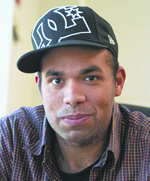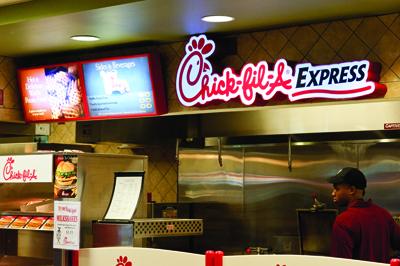Story by MITCHELL Brown, for The Muleskinner
 One hot button issue of the summer was a controversy concerning Chik-fil-A.
One hot button issue of the summer was a controversy concerning Chik-fil-A.
Things started to heat up in July when Chik-fil-A CEO Dan Cathy said that those in favor of same sex marriage are part of a “prideful” and “arrogant” generation.
In the Baptist Press, he declared he was “guilty as charged” on being opposed to same sex marriage.
The controversy continued as some people opposed to Chik-fil-A organized protests and boycotts.
Although the Chik-fil-A controversy has simmered to a silence in the national media, the discussion was reignited at Central during an exhibition debate put on by UCM’s Talking Mules debate team on Sep 6. in the Union.
The topic of the debate was whether or not UCM should abandon Chik-fil-A.
Adam Blood, graduate assistant and coach for the Talking Mules, said that although media attention on the topic has waned, it’s still likely to be fresh in students’ minds.
Two teams were present to give a pro and con side on the issue, the government team, arguing in favor of the motion to abandon Chik-fil-A, and the opposition team, arguing against UCM abandoning Chik-fil-A.
Arguing for the government team were Adam Blood, Micah Chrisman and Ryan Michael. The opposition team was comprised of Shea Holland, Derek Pritchett, and Matt Gilmore.
Blood said the side of an issue someone has to argue on in a debate is not always a reflection of the debater’s personal opinion.
“Most of the time, it is a topic where you may not be ideologically in line with the side you are debating on,” Blood said. “It’s more of an exercise in being able to build arguments as opposed to stating what you actually feel.”
Arthur Rennels, debate coach and assistant professor of communication, affirmed Blood’s statement and said, “the whole point (of the debate) is to test ideas.”

Chik-fil-A was at the center of debate this summer due to comments from its CEO regarding same-sex marriage. (Photo by ANDREW MATHER, Photo Editor)
As the opening round of the debate got started, Chrisman said that his team’s opposition to Chik-fil-A is not an attack on free speech.
He presented reasons for UCM abandoning Chik-fil-A. The first being that Chik-fil-A supports what he called “divisive” groups opposed to the LGBT (lesbian, gay, bi-sexual, transgender ) community.
Chrisman said such a stance runs counter to UCM maintaining a diverse culture.
Audience member David Rogers, freshman political science major, took a stance contrary to Chrismans’.
“The issue of diversity is to represent all groups equally,” Rogers said. “If you are going to make an argument for one side, you also have to make the argument from the other side.”
Blood said that diversity is not just a matter of the presence of demographic representation and that diversity is found in the presence of respect. “ Respect is the precursor for diversity,” Blood said.
Along with matters of diversity and free speech, another source of contention is where Chik-fil-A donates a portion of its profits.
Chrisman noted that it has been documented that from 2003-2010, Chik-fil-A gave an estimated $5 million to groups that are considered to be anti-LGBT, including Focus On The Family, Exodus International and the Family Research Council, which is classified as a hate group by the Southern Poverty Law Center.
“We must recognize that they support these organizations,” Chrisman said.
Matt Gilmore, of the opposition team, said that Chik-fil-A has also donated to the Fellowship of Christian Athletes.
“This is in no way, shape or form a hate group,” Gilmore said. Blood responded to Gilmore’s statement by saying, “We are not going to ignore the evil because you do a large amount of other charitable contributions. Chik-fil-A should be judged by the company they are keeping.”
After the debate, the (hypothetical) resolution to abandon Chik-fil-A was put to an audience vote, in which it was defeated.
An exhibition debate is put on once a month by the Talking Mules. Rennels said the debates are a way to spark dialogue and hear multiple sides of an issue.
“We need to hear from everybody on campus,” Rennels said. “People need to have a venue to express their thoughts, attitudes and beliefs.”


Leave a Reply